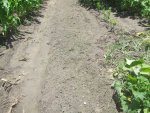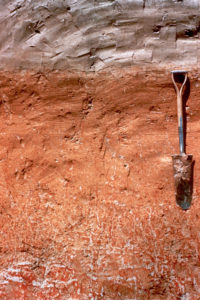Meadowlark
No N-P-K Required
- Joined
- Feb 5, 2019
- Messages
- 2,701
- Reaction score
- 2,250
- Location
- East Texas
- Hardiness Zone
- old zone 8b/new zone 9a
- Country

I’ve started an experiment in the use of summer alfalfa as a garden cover crop in East Texas. Alfalfa has been found to not like our East Texas climate of super heat and even more super humidity as a hay crop…but what about as a cover/rotational crop for the home garden?
It has outstanding N2 fixing qualities and grows vigorously in summer which should offer excellent weed control. I have long recognized that it is also an outstanding soil additive that serves as a natural fertilizer and soil conditioner. Alfalfa pellets are readily available in my feed stores and they have demonstrated to me to be an excellent soil builder, one of the best available.
So, why not the real thing? Alfalfa has an interesting “character” trait that I believe makes it an outstanding candidate for cover/rotation in the garden. Beginning in late summer, physiological changes begin to occur in alfalfa plants where sugar and carbohydrate accumulation is diverted away from stem and leaf growth and toward the root and crown structures of the plant. Sugars act as an “antifreeze” to prevent cell damage during the extreme cold temperatures of winter. Carbohydrates are stored in the roots and crown to provide energy for stem growth during the spring months.
Those stored sugars and carbs sound to me like an ideal summer cover/rotational soil building crop that can be planted after the spring plantings of garden veggies such as corn, a very heavy feeder.
My research has uncovered that alfalfa also has a possibly undesirable characteristic of suppressing other plant germination while it is growing. I’m hopeful this does not carry over to follow on veggie crops.
I would like to hear from anyone who has tried this as a summer cover/rotational crop.
Oneeye are you out there?
The attached photo shows my experimental double row of germinating alfalfa in the garden. Another advantage is that seed is highly available and is relatively cheap about $2 per pound when purchased as a hay crop. Since COVID, I have found that anything for the garden, including my preferred field peas for cover, has taken off in price and has limited availability these days…but not alfalfa seed for hay production.
Comments appreciated and solicited.

It has outstanding N2 fixing qualities and grows vigorously in summer which should offer excellent weed control. I have long recognized that it is also an outstanding soil additive that serves as a natural fertilizer and soil conditioner. Alfalfa pellets are readily available in my feed stores and they have demonstrated to me to be an excellent soil builder, one of the best available.
So, why not the real thing? Alfalfa has an interesting “character” trait that I believe makes it an outstanding candidate for cover/rotation in the garden. Beginning in late summer, physiological changes begin to occur in alfalfa plants where sugar and carbohydrate accumulation is diverted away from stem and leaf growth and toward the root and crown structures of the plant. Sugars act as an “antifreeze” to prevent cell damage during the extreme cold temperatures of winter. Carbohydrates are stored in the roots and crown to provide energy for stem growth during the spring months.
Those stored sugars and carbs sound to me like an ideal summer cover/rotational soil building crop that can be planted after the spring plantings of garden veggies such as corn, a very heavy feeder.
My research has uncovered that alfalfa also has a possibly undesirable characteristic of suppressing other plant germination while it is growing. I’m hopeful this does not carry over to follow on veggie crops.
I would like to hear from anyone who has tried this as a summer cover/rotational crop.
Oneeye are you out there?
The attached photo shows my experimental double row of germinating alfalfa in the garden. Another advantage is that seed is highly available and is relatively cheap about $2 per pound when purchased as a hay crop. Since COVID, I have found that anything for the garden, including my preferred field peas for cover, has taken off in price and has limited availability these days…but not alfalfa seed for hay production.
Comments appreciated and solicited.




